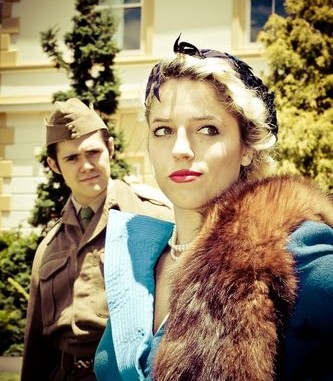
Shakespeare does it again! [by James Wenley]
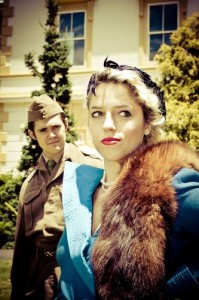
Turns out that Much Ado about Nothing is actually much ado about quite a lot of things…
In some ways a ‘greatest hits’ of Shakespeare’s devices, Much Ado’s comedy takes in bumbling authority figures, a disguised seduction, various tricks played on characters, a Shrew-like Battle of the Sexes… there’s even a sort of small boy Richard III villain, and the plot threatens to get all Romeo and Juliet when, upon the suggestion of the friar (you have to watch out for them), the heroine Hero fakes her own death. In brief, such stuff that Shakespeare does so well.
The University of Auckland Outdoor Summer Shakespeare production, directed by Sam Pascoe, promises Shakespeare under the stars. With this weather, it’s more accurate to say Shakespeare under the clouds. No matter, for who would want to be watching the skies when the action on the lawn is so good.
Much Ado revolves around two couples – Claudio and Hero, who fall instantly in love with each other, and Benedick and Beatrice, who fall instantly in hate. But when they are tricked into thinking that the other one loves them, Benedick and Beatrice tie themselves instead into love knots.
Pascoe has set this version in a post World War Two period with the men returning from war, and entering instead into a domestic battle. It’s a clever choice, in the play text Claudio and Benedick have just returned from battle, and here much fanfare is made of their safe return. It adds some early colour to the play – the men especially dashing in their army uniforms, but becomes of less importance once Shakespeare’s comic twists take centre stage. A fabulous touch is the accompanying swing band (impeccable compositions by Celeste Oram), who play some toe-tapping tunes. Alexandra Clare’s turn as an American Balthasar, the singing servant, is a welcome diversion as she sings ‘Sigh no more…’, warning that “men were deceivers ever”, which couldn’t be more perfect interpreted with 40s-era stylings.
The audience’s seats are an amusing laid-back collection of couches, deck chairs and other kinds. After last year’s jaunt to the flashy Business School for Richard III, they’ve returned to the grass knoll across from the Clocktower used in The Tempest (2009). The set – white garden chairs, columns, and a Greco-Roman bust of a woman – is more timeless than the chosen timeframe, but works in beautifully well with the existing space and stone feature wall. A sprinkling of fairy lights and colour from designers Brad Gledhill and Rachel Marlow add to an inviting picture.
Benedick and Beatrice begin with bickering, a typical masterclass in Shakespeare wordplay. She says she’s rather hear a dog bark at a crow then a man swears he loves her. He’s dismissive of his friend Claudio, and his perception of a love sick weakness. Of course, it’s plain for all to see that these two are destined for each other, and we can’t wait to see this hubris get the better of them. Bates is brilliant as that most threatening of creatures – a woman with opinions! Luke Thornborough is a debonair officer Benedick, with real flair for both the language and pratfall humour. They both get their turns at overhearing their friends (staged) conversations, tricking them into thinking that the object of their hate is in love with them, and it’s wonderful to watch Bates and Thornborough grappling with the news and how to behave in each other’s presence.
Claudio and Hero have a rougher time. Seemingly straightforward, the young, fresh-faced pairing equally are equally enamored with each other, but their love story takes the play into surprisingly darker territory. Alex McDonald is suitably strapping and loved up Claudio, and while Hero is a fairly stock-standard heroine, Natalie Braid invests an intelligent sweetness and life into the role – there’s no question why Claudio would fall for this one.
Their affections catch the jealousy of the Don John, the bastard, who plots to destroy their marriage vows. In an inspired piece of casting, Lucy Smith becomes the sniveling, conniving, Alan Rickman-nasalled villain you love to hate, quickly becoming my favourite of the characters.
Chris Bryan is a great bumbling, buffoonish and gruff constable Dogberry, who wonders into the play and ends up saving the day. He’s accompanied by a troop of inept watchmen, whose slapstick business fell mostly on the side of tiresome rather than light-humour, though the sheer tenacity of one poor actor (Mo Kheir) who is always too late to the scene because of his bent back and slow pace, wins me over towards the end.
Amongst the large ensemble the storytelling is sparklingly clear, making for a Shakespeare that is very watchable and entertaining. Though there is some additional added humour, what really comes through strongly is the inventive wit of Shakespeare’s plots, conveyed well by the cast.
At play’s end a few stars had finally appeared in the sky, but too late, because we were clapping for the real stars as the cast reprised a hearty ‘hey nonny nonny’ and took their deserved bows.
Much Ado about Nothing is presented by AUSA Outdoor Summer Shakespeare and plays at the University Clocktower lawn until 24th March. Tickets from The Maidment.
SEE ALSO: Theatreview review by Nik Smythe

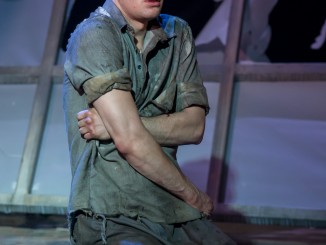
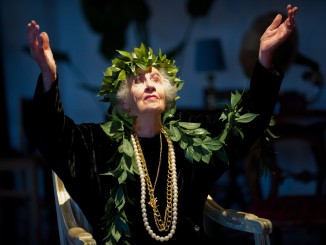
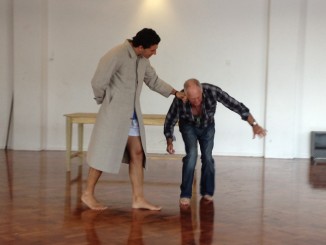
Leave a Reply